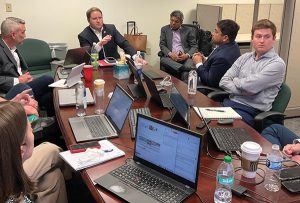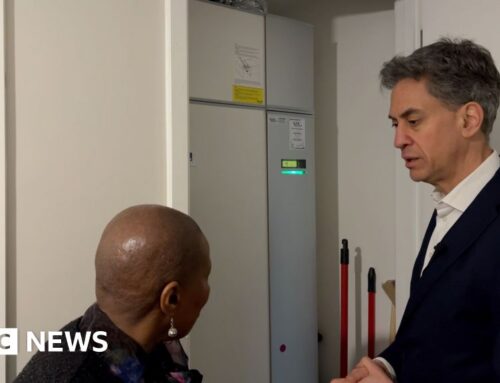Arkansas’ broadband director sees more investment on horizon – Talk Business & Politics
May 25, 2025
Glen Howie is coming up on his three-year work anniversary in Arkansas, and he has more than a billion reasons to celebrate.
Howie is the state’s broadband director, and since he’s entered the picture in August 2022, Arkansas has awarded over $1 billion to broadband providers across the state as they build out the infrastructure to deliver high-speed internet to nearly every community.
“Arkansas is one of only 19 states in the country to be in the billion-dollar club, or receiving allocation in excess of a billion dollars,” Howie said. “We’re ninth in the country per capita.”
The Arkansas State Broadband Office that Howie oversees is a division of the Arkansas Department of Commerce. When he came to Arkansas during Gov. Asa Hutchinson’s administration, the state was already investing hundreds of millions of dollars in internet expansion through funds from the federal Coronavirus Aid, Relief, and Economic Security (CARES) Act and the American Rescue Plan Act (ARPA).
“I think by that point the state had already awarded about $400 million in grants by the time I even got here,” Howie said. “Gov. Hutchinson very much wanted another round to happen before he left office, and so we very quickly executed that for him and got that done, which has been off to a great start. I think project-wise about half of the projects are already completed, which is fantastic. We’re on pace to get those done by the end of next year.”

Another statistic to brag on involves the number of locations around the state building out broadband. The Arkansas Rural Connect program is nearing 125,000 locations. In broadband speak, multiply the locations times 2.5 — for the number of people impacted — and one can estimate that more than 312,000 Arkansans now newly have access to high-speed internet service.
MORE MONEY COMING
Howie’s office isn’t slowing down anytime soon. He notes that more money is on the way. Despite uncertainty and some federal freezing of funds during the presidential transition, Howie is confident the next round of federal funding coming to Arkansas will allow for more investment in rural internet.
Known as BEAD, which stands for Broadband Equity, Access and Deployment, the program is a $42.45 billion federal initiative designed to expand high-speed internet access across the United States. It was part of President Joe Biden’s Infrastructure Investment and Jobs Act. Howie says the state is being proactive in its efforts to utilize that money.
“The next lineup for us is the billion-dollar BEAD program,” he said. “All indications are that it is still a full go. One of Gov. Sarah Sanders’ top priorities is she wants our team to move as fast as we can and move faster, and I always try to do that for her. I think we’re in a good spot.
“Some states have taken the approach of, ‘Let’s kind of pause. Let’s kind of take a step back and see what happens.’ We’ve taken the opposite approach. We’re trying to accelerate our program and move faster, and we think that’s the right way to go.”
Howie’s leadership style is an inclusive one. He’s developed two working groups with which he regularly communicates. All of the internet service provider (ISP) companies and their contractors are invited to a weekly conference call with Howie and his office for updates and to express concerns. He also created a group of community leaders in a majority of the state’s 75 counties that he visits with by conference call twice a month. This Arkansas Broadband Leaders Network consists of city and county leaders as well as business representatives.
Howie credits the open communication for helping Arkansas advance as rapidly as it has.
“I’ve always treated our providers as partners in this process,” Howie said. “The relationship can be different from state to state and how the office approaches it for us. The providers are doing the hard work out in the field every day building this stuff and upgrading their facilities, and we’re a conduit to that. … I understand that, and our team understands that and respects that and appreciates that.”
He also credits smaller utilities and the Electric Cooperatives of Arkansas for their investments and attention to rural areas of the state. Howie said it is a unique relationship compared to other states.
“I think we’re also in a very fortunate position in that in our program you’ve had traditional mom-and-pop telco companies receive grants and be involved,” Howie said. “You’ve had the mid-level folks be involved. I think 15 of the 17 electric cooperatives are in the broadband space. That’s a tremendous help for us when we travel the state. People will always talk about how they have better internet connections at the camp than they do at home from the work that the co-ops have done in building out fiber all across the state.”
WHAT’S NEXT?
While building out the infrastructure is still incomplete, enough has been built to start working on the next phases of expanding broadband in Arkansas.
Howie’s office is charged with not only overseeing the grant process for internet investments, but it also has a mission to promote adoption and underscore opportunities.
“We have a five-year action plan that we put together,” he said. “And really we framed it this way since I’ve gotten here around our three pillars of broadband: access, affordability and digital skills, which we now call opportunity. And all three are equally important.”
Building out the internet networks is vital, but if Arkansans can’t afford the price and don’t understand or utilize its potential, these billions of dollars will have been wasted.
“We’re looking at trying to fund statewide digital skills training to get people trained up on it to help that adoption, to tell better stories about how it can impact their life — whether it’s telehealth with grandmothers and their cancer specialists, or our farmers who can increase their crops with advanced precision ag technology and those types of things,” Howie said.
He said the office is looking at a “learn and earn” model where someone can go through a skills training program and, once complete, would have access to a laptop or Chromebook device to help them take advantage of the high-speed internet in their community.
“That’s the next wave of what we’re looking at,” he said.
Related
Previous post
Search
RECENT PRESS RELEASES
Grid needs ‘sorting out’ for Berkshire solar farm, says minister
SWI Editorial Staff2026-01-30T00:06:26-08:00January 30, 2026|
‘Time to Cash Out’: Top Investor Calls Apple Stock Too Expensive for Slowing Growth
SWI Editorial Staff2026-01-30T00:05:44-08:00January 30, 2026|
Apple Stock (AAPL) Edges Higher After Earnings — What Investors Are Focusing on Now
SWI Editorial Staff2026-01-30T00:05:02-08:00January 30, 2026|
Bitcoin’s Value vs Gold Nears 2017 Levels Despite “Hype,” Peter Schiff Says
SWI Editorial Staff2026-01-30T00:02:48-08:00January 30, 2026|
Bitcoin price today: slumps to $83k as heavy liquidations, Fed uncertainty weigh By Invest
SWI Editorial Staff2026-01-30T00:02:04-08:00January 30, 2026|
US returns to Africa with investment-first strategy as competition for influence intensifi
SWI Editorial Staff2026-01-30T00:00:47-08:00January 30, 2026|
Related Post



